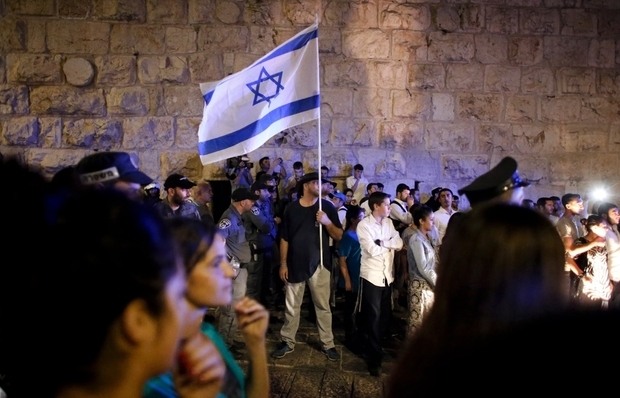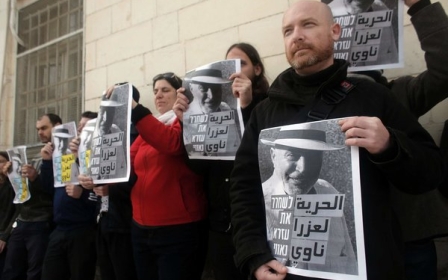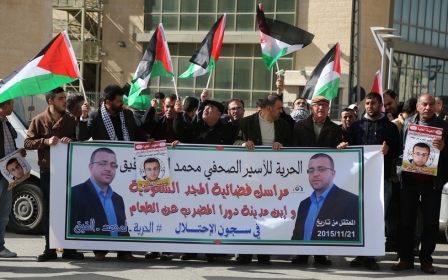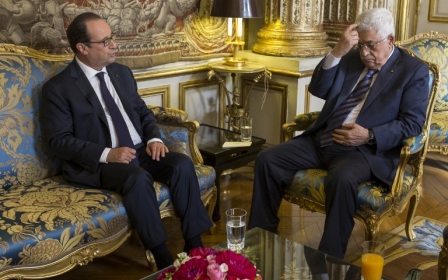Israel's culture war heats up

For the first time since it began two months ago, an aggressive campaign against Israeli human rights organisations and activists has suffered a setback.
Im Tirzu, a right-wing group responsible for much of the campaign, was forced to admit this week that it was wrong, saying: "We published something erroneous on an important and essential subject."
The subject referred to was its campaign identifying leading cultural figures as "planted," a concept it invented to describe Israelis who are allegedly financed by "foreign powers" and act against their own people and government. "Planted" has become a code word for "enemies from within" and traitors.
This worked quite well when it targeted human rights activists. But in its new campaign against those "planted in culture," Im Tirzu tried to paint many icons of Israeli culture as supporters of anti-Israel activity: writers Amos Oz and David Grossman, whose son was killed in Lebanon in 2006, and a long list of respected and beloved writers, actors, artists and singers. It was as if the whole of Israeli secular culture were put on the grill.
Benny Begin, son of Menachem Begin, former prime minister and legendary founding father of the Likud party, was the first to hit back. "The singling out of so-called traitors is an old-fashioned fascist technique," Begin said on Israeli radio. He called for an inquiry into the financing of Im Tirzu in order "to get rid" of the group.
Shortly after the interview with Begin, himself an MK for the Likud party, almost all right-wing leaders from Prime Minister Benyamin Netanyahu down to Education Minister Naftali Bennett and Culture Minister Miri Regev issued statements condemning Im Tirzu's campaign. It had no alternative but to back off.
Im Tirzu (Hebrew for “if you will it,” taken from Theodor Hertzel's famous phrase about the chances to implement Zionism) was founded in 2006. Its main contention is that a minority of "anti-Zionists" financed by foreign governments have taken over Israel's political, cultural and academic life. Its goal is to correct these deviations and return Israeli society to its Zionist origins.
Although claiming to be a centrist group, Im Tirzu's right-wing affiliations are evident. Its founder, Dr Ronen Shuval, became a leading figure first in Avigdor Lieberman's Israel Beitenu (Israel Our Home) party and later in Bennett's Jewish Home party. They have received endorsements from various government ministers and institutions and are mainly financed by donations from right-wing American groups.
Im Tirzu, however, represents a new incarnation of the Israeli right-wing. Most of Im Tirzu's leaders are secular and speak in the name of secular Zionism rather than in the name of God and his promises to his chosen people, as does the settlement movement. In this sense their voices may be closer to neo-fascist discourse than to the traditional national-religious discourse in Israel.
Their emphasis on the supremacy of nation and state over the individual led an Israeli court to rule that writing that Im Tirzu was a fascist organisation was a "truthful publication". In a libel suit filed by Im Tirzu, Judge Refael Ya'akobi of Jerusalem's District Court found that there is "common ground between its [Im Tirzu] positions and certain founding principles of fascism".
Israel's High Court later annulled the verdict but ruled the libel suit shouldn’t have been heard in the first place. In short, referring to Im Tirzu as fascist isn’t considered libelous, according to Israeli courts.
These rulings didn’t stop Im Tirzu from hunting civil rights organisations and focusing on those opposed to the Israeli occupation, including B'tzelem and Breaking the Silence, or those supporting the Palestinian minority in Israel like Adala.
It is evident, however, that with the campaign against "planted-in culture" it went too far.
The question is whether this is a turning point or a hiccup.
It is clear that Im Tirzu is a part of a larger picture. The beginning of their "planted" campaign against human rights activists coincided with a law proposed by Justice Minister Ayelet Shaked from the Jewish Home party to curtail the activity of these same organisations by requiring them to wear special badges in order to indicate they are receiving funds from "foreign entities".
The campaign against "planted in culture" began just a few days before Culture Minister Miri Regev proposed a law called "loyalty in culture,” according to which "support for a cultural institution [would be] dependent on its loyalty to the State of Israel". It is difficult not to see a connection between Im Tirzu's campaigns and the policy proposals.
This can all be seen as a "culture war" in Israel. Last week, amid Regev's proposal and Im Tirzu's campaign, it came to light that a new high school textbook in "civic studies" - a subject combining political science with Israeli history - is being rewritten with a strong right-wing bias.
It is not clear how deep Education Minister Bennett is involved with the content of the book, but the fact that he hurried to defend the authors of the text, which wrongly stated, for example, that most attacks in a current wave of violence were committed by "Israeli Arabs," adds fuel to the cultural war.
The summary arrest of activists from the left-wing Ta'ayush group for allegedly conspiring to hand over Palestinian middlemen involved in selling Palestinian lands in the West Bank to Jewish buyers – an accusation later rejected by the court – strengthens the impression that Israeli liberals are under attack.
There are those who say this attack is a result of the growing effectiveness of these human rights organisations in the international community. There are those who say that Israel is not really threatened and these campaigns are the manifestations of a "Weimar syndrome" where the right-wing parties are in constant search for internal enemies, real or imagined, in order to bolster their control over civil society.
What is certain is that up until the "planted-in culture" campaign, the attitude bore fruit. Both main parties of the centre-left, the Zionist Camp of Isaac Herzog and Yair Lapid's Yesh Atid, distanced themselves from the human rights organisations and adopted positions closer to those of Netanyahu. Herzog, for example, declared recently that the two-state solution was no longer realistic.
The surprise is that Israeli liberals and the radical left are showing unexpected signs of fighting back. Detainees from Ta'ayush received wide support until they were released. The rewriting of the civic studies textbook was widely criticised. And writers and artists who appeared on Im Tirzu's list didn’t apologise, but instead reiterated their support for human rights organisations and their opposition to Israeli’s occupation.
This contributed a pullback by Im Tirzu, yet it will probably be only a temporary victory. The onslaught against those Israelis who oppose the occupation will almost certainly resume. When France is considering unilateral recognition of a Palestinian state and when the US is poised to mark settlements' products, the Israeli right-wing must ensure that its rearguard is safe while it battles a hostile international environment. Too much is at stake.
- Meron Rapoport is an Israeli journalist and writer, winner of the Napoli International Prize for Journalism for a inquiry about the stealing of olive trees from their Palestinian owners. He is ex-head of the News Department in Haaertz, and now an independent journalist.
The views expressed in this article belong to the author and do not necessarily reflect the editorial policy of Middle East Eye.
Image: Former Israeli army soldiers discuss in front of photographs at an exhibition of the Israeli NGO "Breaking the Silence" at the Kulturhaus Helferei on 3 June 2015 in Zurich (AFP)
- See more at: http://www.middleeasteye.net/columns/israel-enemy-within-1035086825#sthash.kri5xyzd.dpuf- Meron Rapoport is an Israeli journalist and writer, winner of the Napoli International Prize for Journalism for a inquiry about the stealing of olive trees from their Palestinian owners. He is ex-head of the News Department in Haaertz, and now an independent journalist.
The views expressed in this article belong to the author and do not necessarily reflect the editorial policy of Middle East Eye.
Image: Former Israeli army soldiers discuss in front of photographs at an exhibition of the Israeli NGO "Breaking the Silence" at the Kulturhaus Helferei on 3 June 2015 in Zurich (AFP)
- See more at: http://www.middleeasteye.net/columns/israel-enemy-within-1035086825#sthash.kri5xyzd.dpuf- Meron Rapoport is an Israeli journalist and writer, winner of the Napoli International Prize for Journalism for a inquiry about the stealing of olive trees from their Palestinian owners. He is ex-head of the News Department in Haaertz, and now an independent journalist.
The views expressed in this article belong to the author and do not necessarily reflect the editorial policy of Middle East Eye.
Image: Former Israeli army soldiers discuss in front of photographs at an exhibition of the Israeli NGO "Breaking the Silence" at the Kulturhaus Helferei on 3 June 2015 in Zurich (AFP)
- See more at: http://www.middleeasteye.net/columns/israel-enemy-within-1035086825#sthash.kri5xyzd.dpuf- Meron Rapoport is an Israeli journalist and writer, winner of the Napoli International Prize for Journalism for a inquiry about the stealing of olive trees from their Palestinian owners. He is ex-head of the News Department in Haaertz, and now an independent journalist.
The views expressed in this article belong to the author and do not necessarily reflect the editorial policy of Middle East Eye.
Image: Former Israeli army soldiers discuss in front of photographs at an exhibition of the Israeli NGO "Breaking the Silence" at the Kulturhaus Helferei on 3 June 2015 in Zurich (AFP)
- See more at: http://www.middleeasteye.net/columns/israel-enemy-within-1035086825#sthash.kri5xyzd.dpuf- Meron Rapoport is an Israeli journalist and writer, winner of the Napoli International Prize for Journalism for a inquiry about the stealing of olive trees from their Palestinian owners. He is ex-head of the News Department in Haaertz, and now an independent journalist.
The views expressed in this article belong to the author and do not necessarily reflect the editorial policy of Middle East Eye.
Image: Israel's political right wing may have found itself uncomfortable with the Im Tirzu group (AFP)
- Meron Rapoport is an Israeli journalist and writer, winner of the Napoli International Prize for Journalism for a inquiry about the stealing of olive trees from their Palestinian owners. He is ex-head of the News Department in Haaertz, and now an independent journalist.
The views expressed in this article belong to the author and do not necessarily reflect the editorial policy of Middle East Eye.
Image: Former Israeli army soldiers discuss in front of photographs at an exhibition of the Israeli NGO "Breaking the Silence" at the Kulturhaus Helferei on 3 June 2015 in Zurich (AFP)
- See more at: http://www.middleeasteye.net/columns/israel-enemy-within-1035086825#sthash.kri5xyzd.dpuf- Meron Rapoport is an Israeli journalist and writer, winner of the Napoli International Prize for Journalism for a inquiry about the stealing of olive trees from their Palestinian owners. He is ex-head of the News Department in Haaertz, and now an independent journalist.
The views expressed in this article belong to the author and do not necessarily reflect the editorial policy of Middle East Eye.
Image: Former Israeli army soldiers discuss in front of photographs at an exhibition of the Israeli NGO "Breaking the Silence" at the Kulturhaus Helferei on 3 June 2015 in Zurich (AFP)
- See more at: http://www.middleeasteye.net/columns/israel-enemy-within-1035086825#sthash.kri5xyzd.dpufMiddle East Eye propose une couverture et une analyse indépendantes et incomparables du Moyen-Orient, de l’Afrique du Nord et d’autres régions du monde. Pour en savoir plus sur la reprise de ce contenu et les frais qui s’appliquent, veuillez remplir ce formulaire [en anglais]. Pour en savoir plus sur MEE, cliquez ici [en anglais].





